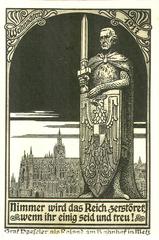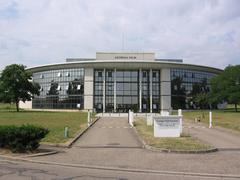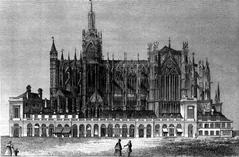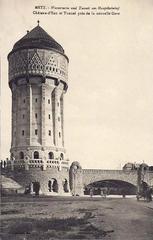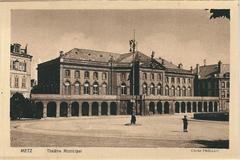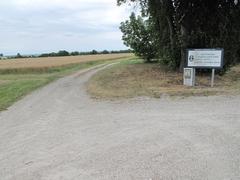
Ancienne Gare de Metz: Visiting Hours, Tickets, and Historical Sites in Metz
Date: 04/07/2025
Introduction
The Ancienne Gare de Metz stands as one of the city’s most significant historical and architectural landmarks. Located in the heart of Metz, France, this former railway station is a powerful emblem of the region’s layered Franco-German heritage, impressive Neo-Renaissance design, and successful adaptive reuse. Today, it serves as the headquarters of INSEE (France’s National Institute of Statistics and Economic Studies), but its past as a symbol of imperial ambition, urban transformation, and resilience remains vividly present. This guide explores the Ancienne Gare de Metz’s fascinating history, architectural features, restoration efforts, practical visitor information—including visiting hours, ticketing, accessibility—and nearby attractions, providing everything you need to enrich your exploration of Metz’s historical sites.
Table of Contents
- Historical Overview (1878–1908)
- Architectural Significance
- Transformation and Adaptive Reuse
- Preservation and Contemporary Role
- Visitor Information
- Frequently Asked Questions (FAQ)
- Visuals & Media
- Conclusion & Call to Action
- References
Historical Overview (1878–1908)
The Ancienne Gare de Metz was inaugurated in 1878, during German control of the region following the Franco-Prussian War and the annexation of Alsace-Lorraine. Strategically integrated into the German railway network, the station was constructed as part of a broader effort to modernize the city’s infrastructure, project imperial authority, and reinforce Metz’s role as a regional hub (wikimetz.fr; actu.fr). The station’s location at Place du Roi-George, just outside the former city ramparts in the “Nouvelle Ville” (New Town) district, marked a pivotal shift from medieval urban patterns toward modern city planning.
After serving as Metz’s principal railway station for 30 years, the Ancienne Gare was replaced in 1908 by the larger Metz-Ville station, which reflected the evolving needs of the city and the ambitions of the German Empire.
Architectural Significance
Design and Materials
Designed by German architect Johann Eduard Jacobsthal, the Ancienne Gare de Metz exemplifies the Neo-Renaissance style. It was the first major Metz building to use Jaumont stone—a golden regional limestone—ensuring both durability and a visual connection to the city’s historic core (wikimetz.fr).
Key Features and Decorative Elements
- U-Shaped Plan: Featured a central courtyard, originally housing four platform tracks under two expansive glass-and-iron canopies.
- Monumental Entrances: Dominant cast-iron doors (9 meters high) and symmetrical pavilions emphasized grandeur and imperial power (metz.fr).
- Frescoes and Heraldry: Interior décor included frescoes of German city coats of arms, reinforcing the station’s symbolic role as a node of imperial connectivity.
- Ironwork: Ornate iron columns and decorative details showcased 19th-century industrial artistry.
Transformation and Adaptive Reuse
After its closure as a passenger terminal in 1908, the station transitioned to various administrative roles. It became the regional headquarters for SNCF (French National Railways) in 1938, which led to modifications such as the removal of the original pediments and the addition of a modern office floor in the 1950s. The 1970s brought further changes, including the addition of new stone and concrete structures and a covered parking area (wikimetz.fr).
A landmark renovation began in the late 2010s, culminating in the building’s reopening in 2022 as the INSEE regional headquarters. This €20 million project balanced heritage preservation with modern functionality, restoring key historical features and creating contemporary office spaces and landscaped courtyards (BLE Lorraine; Moselle TV).
Preservation and Contemporary Role
The renovation prioritized the conservation of the station’s most distinctive elements:
- Façade with Lion Heads: Eight lion heads symbolize imperial authority.
- Restored Monumental Doors: Original wooden doors, now decorative due to modern safety regulations.
- Historic Staircases and Murals: Staircases and frescoes, including a Goethe poem and heraldic motifs, were carefully preserved.
- Landscaped Courtyard: Integrates historic railway artifacts and new green spaces.
Today, the Ancienne Gare de Metz is a protected heritage site and a vibrant symbol of Metz’s resilience and evolving identity (wikimetz.fr; BLE Lorraine).
Visitor Information
Visiting Hours & Access
The Ancienne Gare de Metz operates primarily as an administrative building and is not open for regular public visits. The best opportunity to explore its interior is during special occasions such as the European Heritage Days (Journées Européennes du Patrimoine), typically held in September. For up-to-date information on open days and events, consult the official Metz city website.
Tickets & Entry Fees
- No general ticket or entry fee is required to view the exterior.
- Guided tours during special events may require advance booking and a modest fee.
Accessibility
- The building is adapted for wheelchair access and modern standards.
- Public areas and the surrounding Place du Roi-George are accessible for all visitors.
Getting There
- Address: Place du Roi George, 57000 Metz, France.
- Transport: Easily reached by bus, tram, or on foot from Metz-Ville station and the city center.
- Parking: Public parking is available nearby, including a partially vegetated lot in the former courtyard.
Guided Tours & Special Events
Guided tours are available during heritage events and special cultural festivals. These tours delve into the building’s architecture, history, and symbolism and are often organized by the city or local heritage associations.
Photography & Nearby Attractions
- The station’s Jaumont stone façade, monumental doors, and lion heads are photogenic, especially at sunrise or sunset.
- Combine your visit with nearby sites: Metz-Ville station, Imperial Quarter, Saint-Étienne Cathedral, and Centre Pompidou-Metz (francetravelplanner.com; The Tourist Checklist).
Frequently Asked Questions (FAQ)
Q: Can I visit the interior of the Ancienne Gare de Metz?
A: The interior is generally closed to the public except during special events like European Heritage Days.
Q: Are there regular visiting hours or entry fees?
A: No regular visiting hours or fees. Exterior viewing is available any time.
Q: How do I get there?
A: Located at Place du Roi George, accessible by public transport, taxi, or on foot.
Q: Is the site accessible for people with disabilities?
A: Yes, the building and surrounding area are wheelchair accessible.
Q: Are guided tours available?
A: Tours are offered during special events. Check local event calendars or the tourist office for details.
Visuals & Media
- Photographs: Capture the façade, monumental doors, and decorative details.
- Virtual Tours & Maps: Available via official tourism websites.
- Alt Tags for SEO: Use descriptions like “Ancienne Gare de Metz visiting hours,” “historic railway station in Metz,” and “Metz historical sites old station exterior.”
Conclusion & Call to Action
The Ancienne Gare de Metz is a vivid reminder of the city’s shifting borders, architectural grandeur, and cultural resilience. Whether you view its impressive façade or participate in a special guided tour, the station offers a unique lens on Metz’s Franco-German heritage and adaptive urban spirit. Plan your visit around cultural events, explore the vibrant Imperial Quarter, and deepen your experience with the Audiala app for guided audio tours and updated visitor information.
Stay informed about upcoming events and tours by following Metz tourism channels and Audiala on social media. Share your photos and stories to inspire fellow travelers to discover Metz’s remarkable historical sites.
References
- Exploring the Ancienne Gare De Metz: History, Architecture, and Visitor Guide (actu.fr)
- Visiting Ancienne Gare de Metz: History, Architecture, and Visitor Information (wikimetz.fr)
- Visiting the Ancienne Gare de Metz: History, Restoration, and Visitor Information (BLE Lorraine)
- Moselle TV Coverage of INSEE Headquarters
- Metz City Official Website: European Heritage Days and Ancienne Gare
- The Tourist Checklist: Things to Do in Metz
- France Travel Planner: Metz Historical Sites


